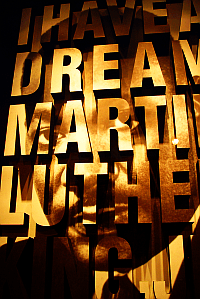That hasn’t happened, not in the United States, and not anywhere else. Although the blatant racism of the past — the lynchings, the Klan rallies,the pogroms, the concentration camps — are no longer acceptable in most societies (though they keep rearing up with troubling regularity — consider Bosnia, Rwanda, Sudan, and Guantanamo Bay), race and racism are still factors in most people’s lives, and still create barriers to many people’s ability to succeed. This affects us all. When a child is denied access to a top-notch education because she belongs to a despised minority, or because it’s assumed that his group just isn’t smart enough, or even that it’s pointless to waste resources on children who will not be able to make use of it because of racism, we as a society lose out on the particular talents and strengths that child might have had to offer if given a chance to develop them. When leadership is associated with the qualities of one group, we as a society limit the possibilities for innovation and new direction. (Take a look at the US Senate if you want to see how Americans think of leadership. Ask yourself what innovation you expect of these 88 white men, 11 white women, and 1 black man.)
Race and racism affect our personal lives, as well, even if we’re not in the minority. Take a look around you next time you go to a place where people socialize. Chances are you’ll see little clumps of similarly-colored people — whites with whites, blacks with blacks, Asians with Asians, and so on. Even today, it’s rare for a person to have more than one or two people of differing race (if any) in their circle of friends.
When I ask my students why this is, they tend to say something like, “It’s natural for people to want to be with people who are like them.” They’re probably right — but why do we think people of our race are the most like us, instead of, say, people who share our values, or people who share our profession, or people who share our taste in books? And why are certain kinds of music, movies, literature, clothes, and so on still associated with people of specific races?
Was this Dr. King’s dream?
I say, we still have a long way to go to make the dream a reality. While some change will have to be legislated, there are lots of things each of us as individuals can do to minimize the amount and effect of racism in our lives and in the lives of those around us.
The problem of racism is a big one, but it’s not an impossible one. Here are 12 things you can do — not always easy things, but ultimately doable things — to start making a difference in your the world around you. In the end, they boil down to “respect others” and “know thyself”, good advice for most situations. It doesn’t take a huge number of people to start making a difference — after all, Martin Luther King made a difference and he was just one person. Just like you are.
